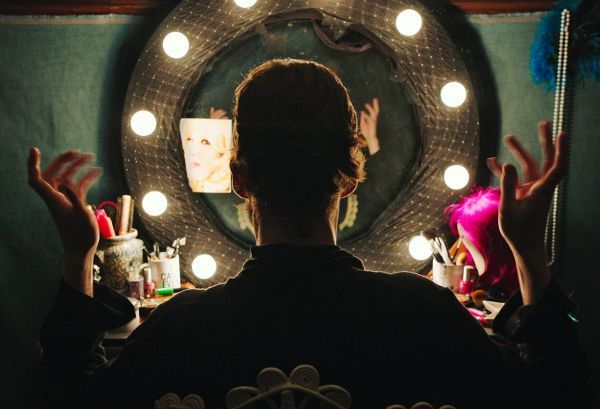Eye For Film >> Movies >> Freak Show (2017) Film Review
Freak Show
Reviewed by: Jennie Kermode

Is it nobler in the mind to suffer the slings and arrows of outrageous fortune, or to take arms against a sea of troubles, and by opposing end them? In Shakespeare's time that was a difficult question. For most of the last century, society's answer was clear: those who suffered the most outrage should nobly suffer and accept their lot in life. Now things are changing. Billy Bloom (Alex Lawther) is part of a new generation. He's not willing to suffer for the sake of being perceived as noble, or being a little safer. He's ready to take up arms - as glamorously as possible.
"This isn't Connecticut, you know," warns his father's housekeeper, Florence (a stalwart Celia Weston). "You're in the red states now." Indeed he is, having been transported to the mansion occupied by his wealthy but largely absent father (Larry Pine) following the sudden disappearance of his adored, flamboyant, alcoholic mother (Bette Midler). Adjusting takes quite an effort. Florence suggests that he wear blue jeans. Perhaps wary of the way people react when they smell fear, and not very good at the whole 'straight acting' thing, Billy marks his first day at his new high school by wearing a pirate shirt, a highly decorated little black jacket and a rather fetching hat. When that doesn't go down well, he tries a dress.
It doesn't take a genius to work out that the road Billy is on will lead to violence, but this film makes a strong case to the effect that it's worth walking anyway, and that the risks Billy is taking are the only way to bring about change that is needed by others as well as himself. Sometimes it's a little preachy about this, but that's excusable in a film aimed squarely at a teenage audience, and it's not the only thing going on. For all his boldly professed dedication to fabulousness, Billy has all the usual teenage weaknesses, and when he starts to get positive attention from the hero of the school football team, his head is well and truly turned. As the square jawed, unexpectedly sensitive Filp, Ian Nelson is straight out of a John Hughes movie. It's coming up to prom. The race is on to find the school's Homecoming Queen. A familiar narrative beckons, but though it stays close to type, this film is just a little too smart to make things that simple.
High school films are changing as teenage ambitions do. The focus is now less on romance and more on learning how to assert oneself as an individual, something that Billy isn't quite as au fait with as he might think. Growing up means facing up to family problems, acknowledging the advantages he has in life and recognising the complexities of other people. None of the teenagers here are one note characters. Nelson brings surprising depth and complexity to Flip, and Christopher Dylan White is impressive as troubled outsider Bernard, who hides his fears behind a carefully constructed obnoxious exterior. The ever-reliable Abigail Breslin, with a sly tip of the hat to Scream Queens, clearly relishes the role of popular girl Lynette, balancing the viciouness that social role requires with an awkwardness that quickly reveals how far out of her depth the girl is, and giving her a more human aspect than is usual in such tales. She's particularly impressive in scenes with Laverne Cox, who plays a local reporter whose adult self-assuredness puts the teen drama into stark perspective.
A film like this is a costume designer's dream and Colleen Atwood and Sarah Laux have clearly had a lot of fun creating Billy's outfits. The truly over the top nature of some of these (looks that simply take too long to create to be slipped on after school) gives the film that edge of unreality shared by a lot of the most successful films in the genre, acknowledging its importance as fantasy to kids facing similar struggles. It's brightly lit throughout and has a glossy look to it that feeds that fantasy. A eclectic soundtrack seems set to be a hit with fans.
The best high school movies always pushed boundaries. Trudie Styler's contribution is less a reinvention than an appropriation of an existing toolkit, reworked to send a message that differs only in the details. It's a film in which style inevitably triumphs over substance, but there's more substance here than you might expect.
Reviewed on: 04 Jul 2017

















